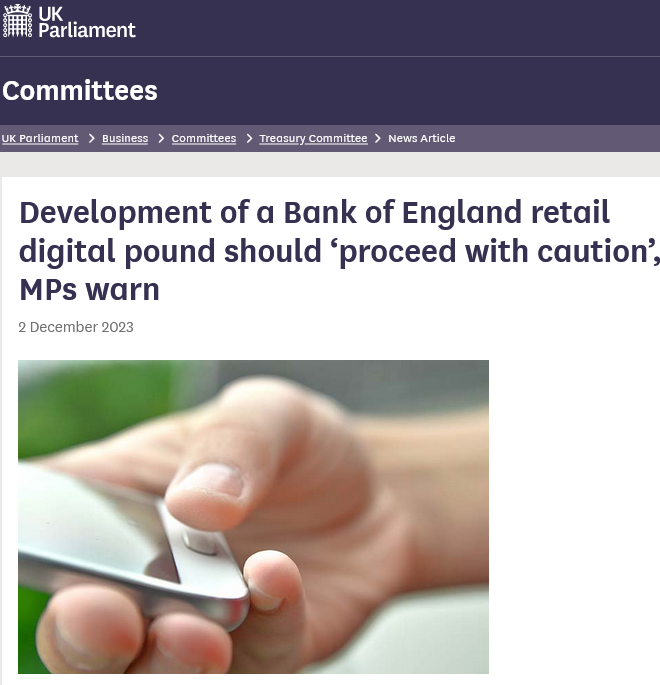Published on 9th December 2023
The Treasury Select Committee has issued report about the Bank of England’s digital pound project, also known as ‘Britcoin’, and a UK ‘central bank digital currency’ or ‘CBDC’.
You can download the report here
Its headlines are:
- ‘Britcoin’ must be introduced via primary legislation that is subject to full Parliamentary scrutiny, and not slipped through via secondary legislation;
- This primary legislation must incorporate a prohibition on the Bank of England and the government from using data ‘for any purposes beyond those already permitted for law enforcement’;
- Particular care is needed to block the misuse of customer data by the user-facing firms within the ‘Britcoin’ distribution model;
- ‘Britcoin’ should ‘support financial inclusion to the greatest possible extent’ and at all costs it should not make financial exclusion worse;
- The Bank of England and HM Treasury must do more work on the potential impact of ‘Britcoin’ on financial stability, for example the amount of bank deposits that might be withdrawn and re-invested in ‘Britcoin’ and how that facility might exacerbate a ‘run’ on a bank;
- The major challenges – to privacy and financial stability – are clear but the size of the benefits is not, nor that ‘Britcoin’ is the only way of garnering those benefits;
- The committee supports that further research be done but not at the expense of distracting the Bank of England from its core task of controlling inflation;
- That research might have side benefits like improving the Bank’s understanding of new payment technologies (a double-edged recommendation, as if that understanding were currently lacking);
- Any proposal to move into production must be accompanied by a Cost-Benefit Analysis and one conducted from a neutral standpoint (this wording is quite a finger-wagging at the Bank);
- In fact the project costs from now on should be reported as a distinct and separate line item.
All in all, hardly a glowing endorsement from the Treasury Select Committee.
More like a school end-of-term report redolent with instances of ‘must try harder’, ‘more thought needed’, and ‘the candidate seems to believe that their innate and self-confessed brilliance will see them through, without the requisite amount of hard work’. Wasn’t that what a certain housemaster at Eton wrote about a certain former Prime Minister?

